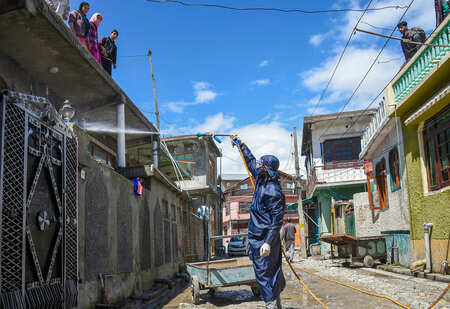- Diagnostics
- 2 min read
Health workers act as foot soldiers, go door to door to trace those infected
Community health workers (CHW) are the government's street-level machinery in the fight against an epidemic, or for the implementation of health programmes like polio vaccines. Nadumani has surveyed 200 homes in Dharavi after the first positive case of Covid-19 was detected in the area a few days ago.
Community health workers (CHW) are the government's street-level machinery in the fight against an epidemic, or for the implementation of health programmes like polio vaccines. Nadumani has surveyed 200 homes in Dharavi after the first positive case of Covid-19 was detected in the area a few days ago.
Armed with a small handbag, a sheet of paper and her dupatta for a mask, Nadumani and her colleague Ujwala Sawant have been visiting buildings and slums in Dharavi to compile a list of the high risk contacts in the area. "I have been a community heath worker for the last 25 years. I have worked during many outbreaks-swine flu, cholera, malaria. But this has been one of the toughest times I have seen. Our family is worried about our safety, but it's our job, we have to do it," said Nadumani.
She said that usually, they are the first responders, but their own health has been ignored. "I have been working as a CHW for so long, and yet I am not a permanent staffer. We are being paid only Rs 5,000 per month for the last 5 years. We do not even have any health insurance. Treatment in a BMC hospital is not free for us either," she said.
Sawant said that they have worked in Dharavi for many years. Earlier, people would not even let them come inside their homes. As health workers, they would struggle to convince the residents of the importance of the polio vaccine, and why they should bring their children to the booth. "We have come a long way. I have helped get ambulances for pregnant women to go to a hospital for delivery. It was a very difficult task to convince people that a pregnant woman deliver in the hospital and not at home," she said.
About the Covid-19 survey, Nadumani said that they had been trained and given basic information about the virus and how it spreads. "When we go to people's houses now, they have questions for us. Most of their questions are based on what they have read on WhatsApp or heard from others. We tell them not to believe hearsay and to contact the government for correct information," said Nadumani.



COMMENTS
All Comments
By commenting, you agree to the Prohibited Content Policy
PostBy commenting, you agree to the Prohibited Content Policy
PostFind this Comment Offensive?
Choose your reason below and click on the submit button. This will alert our moderators to take actions